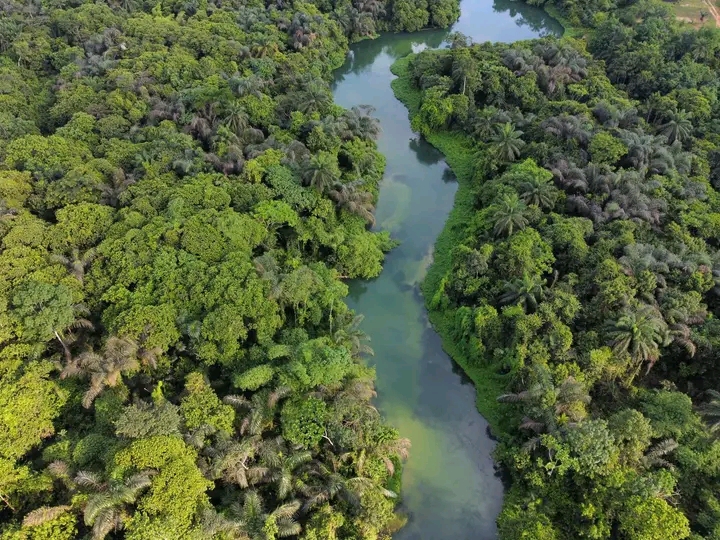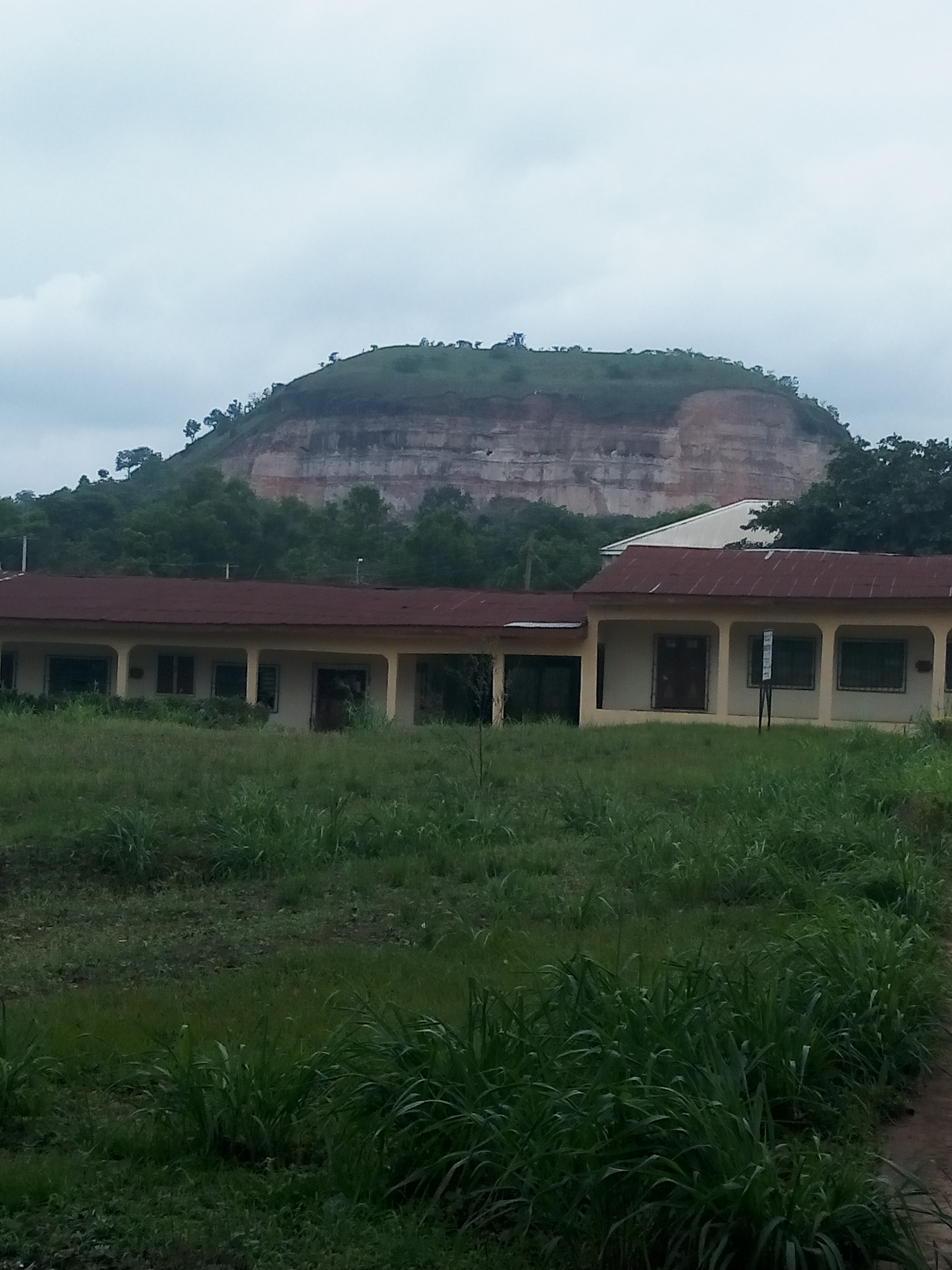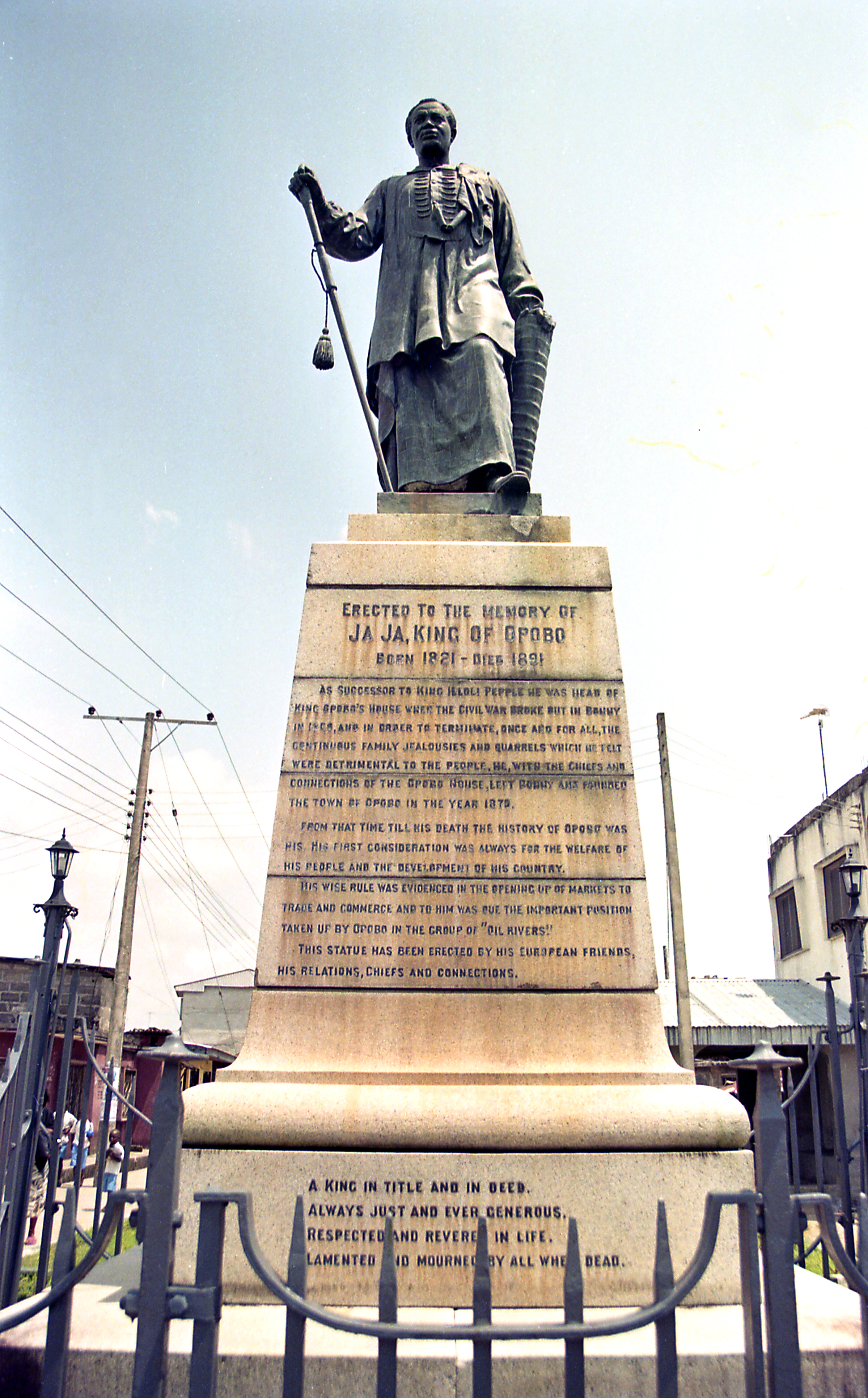|
Akwete
Akwete town is the headquarters of Ukwa East local government area of Abia state, Nigeria. Akwete is located 18 Kilometers northeast of the oil-rich city of Port Harcourt and 18 Kilometers southeast of the commercial city of Aba. Akwete is an important community of the Ndoki and Igbo people in general, they belong to the Umuihueze II clan. Akwete is known in West Africa for its unique weaving. In the early 19th-century Akwete was one of the main destinations of Aro slave traders and they brought Igbo and other people they had enslaved or purchased from other enslavers to the coast. One of the people who was brought to Akwete by this trade was Jaja of Opobo who later became the king of the city-state of Opobo. Akwete was also involved in the palm oil trade, and when Jaja was brought there while enslaved in about 1830 the palm oil trade had become the main export trade of Akwete. Etymology The origin of the name Akwete has over the years been a subject of controversy. In the typ ... [...More Info...] [...Related Items...] OR: [Wikipedia] [Google] [Baidu] |
Akwete Cloth
Akwete cloth is a unique hand woven textile produced in Igboland for which the town of Akwete in Abia state, Nigeria is famous. The traditional Igbo weaving as demonstrated in Akwete processes sisal, hemp, raffia, cotton Cotton is a soft, fluffy staple fiber that grows in a boll, or protective case, around the seeds of the cotton plants of the genus ''Gossypium'' in the mallow family Malvaceae. The fiber is almost pure cellulose, and can contain minor perce ... or other fibres into finished products.''Akwete cloth: An Igbo textile art'' Vanguard Newspaper JULY 26, 2012 While the coarse raffia materials are used by masquerades and in the past as headgear for warriors among other uses, the hemp material was used to weave towels, ropes and handbags. The more comfortable and colorful spun cotton is used to weave cloth for everyday wearing. Technique Weaving is done on a loom. There are two types of loom, the horizontal loom used by men and the vertical loom used by women. ... [...More Info...] [...Related Items...] OR: [Wikipedia] [Google] [Baidu] |
Ukwa East
Ukwa East is a Local Government Area located in Abia State, Nigeria. Its headquarters is in the town of Akwete. Ukwa East is bordered by Akwa Ibom State and Rivers States. It has an area of 280 km and a population of 58,865 at the 2006 census. It has 10 political wards recognised by the Independent National Electoral Commission (''INEC''), a body that conducts national elections for Nigeria and 14 political wards recognised by the Abia State Independent Electoral Commission, a body that conducts elections for Abia State. Ukwa East shares Azumini border with Akwa Ibom State. The postal code A postal code (also known locally in various English-speaking countries throughout the world as a postcode, post code, PIN or ZIP Code) is a series of letters or digits or both, sometimes including spaces or punctuation, included in a postal a ... of the area is 452. References Local Government Areas in Abia State {{AbiaNG-geo-stub ... [...More Info...] [...Related Items...] OR: [Wikipedia] [Google] [Baidu] |
Abia State
Abia State ( ig, Ȯha Abia) is a state in the South-East geopolitical zone of Nigeria, it is bordered to the north and northeast by the states of Enugu, and Ebonyi, Imo State to the west, Cross River State to the east, Akwa Ibom State to the southeast, and Rivers State to the south. It takes its name from the acronym for four of the state's most populated regions: Aba, Bende, Isuikwuato, and Afikpo. The state capital is Umuahia while the largest city and commercial centre is Aba. Abia is the 32nd largest in area and 27th most populous with an estimated population of over 3,720,000 as of 2016. Geographically, the state is divided between the Niger Delta swamp forests in the far south and the drier Cross–Niger transition forests with some savanna in the rest of the State. Other important geographical features are the Imo and Aba Rivers which flow along the Abia's western and southern borders, respectively. Modern-day Abia State has been inhabited for years by various eth ... [...More Info...] [...Related Items...] OR: [Wikipedia] [Google] [Baidu] |
Abia State
Abia State ( ig, Ȯha Abia) is a state in the South-East geopolitical zone of Nigeria, it is bordered to the north and northeast by the states of Enugu, and Ebonyi, Imo State to the west, Cross River State to the east, Akwa Ibom State to the southeast, and Rivers State to the south. It takes its name from the acronym for four of the state's most populated regions: Aba, Bende, Isuikwuato, and Afikpo. The state capital is Umuahia while the largest city and commercial centre is Aba. Abia is the 32nd largest in area and 27th most populous with an estimated population of over 3,720,000 as of 2016. Geographically, the state is divided between the Niger Delta swamp forests in the far south and the drier Cross–Niger transition forests with some savanna in the rest of the State. Other important geographical features are the Imo and Aba Rivers which flow along the Abia's western and southern borders, respectively. Modern-day Abia State has been inhabited for years by various eth ... [...More Info...] [...Related Items...] OR: [Wikipedia] [Google] [Baidu] |
Opobo
Opobo is a community in Rivers State, in the South South region of Nigeria. The kingdom was founded in 1870 by Jubo Jubogha, popularly known as JaJa, an Igbo man who owned slaves. The native language of Opobo is the Ibani language that is spoken in Bonny. A greater part of the city state is still referred to as Opobo in Rivers State. Opobo is made up of several islands and communities which is in Opobo–Nkoro Local Government Area in the South South Senatorial District of Rivers State Nigeria. The communities include Opobo Town, which is its headquarters, Queenstown, Kalasunju, Oloma, Ayaminimah, Iloma, Minimah, Okpukpo, Iwoma, Ekereborokiri, Kalaibiama, Epelema, Ozuobulu, Muma Down Below, Inokiri and Abazibie. Opobo's geologic setting is similar to the coastal and estuarine settlements of the Niger Delta region. It is located at the mouth of the Imo River, one of the main estuaries that break the Nigerian coastline. The approximate geographical co-ordinates of the kingdom are 04 ... [...More Info...] [...Related Items...] OR: [Wikipedia] [Google] [Baidu] |
Abia
Abia or ABIA may refer to: ABIA * Austin-Bergstrom International Airport, in Austin, Texas, United States * Australian Book Industry Awards, national literary and industry awards People * Abia (name) * Abia (mythology), the nursemaid of Glenus, the son of Heracles Places * Abia State, state in southeastern Nigeria ** Abia State University ** Abia State Polytechnic ** Abia Warriors F.C., based in the city of Umuahia, Abia State * Abia de las Torres, a municipality in the province of Palencia, Castile and León, Spain * Abia de la Obispalía, a municipality in Cuenca, Castile-La Mancha, Spain * Abia Community, a constituency and community council in the Maseru Municipality in the Maseru District of Lesotho * Abia (Messenia), town of ancient Messenia, now occupied by Avia, Messenia, Peloponnese, Greece *Abia, Enugu State, town in Enugu State, Nigeria Other * ''Abia'' (sawfly), genus of conifer-feeding sawflies * Abias Abias is a saint of the Coptic Church. He is included i ... [...More Info...] [...Related Items...] OR: [Wikipedia] [Google] [Baidu] |
Edo Language
Edo (with diacritics, ), colloquially called Bini (Benin), is a language spoken in Edo State, Nigeria. It is the native language of the Edo people and was the primary language of the Benin Empire and its predecessor, Igodomigodo. Distribution Most of the Edo language-speakers live in Edo State, Nigeria. A smaller number of speakers are also found in Delta State and Ondo State and in other parts of Nigeria. Edo is an Edoid language. This languages are also spoken in Rivers State and Bayelsa State, Nigeria. Phonology Vowels There are seven vowels, , all of which may be long or nasal, and three tones. Consonants Edo has a rather average consonant inventory for an Edoid language. It maintains only a single phonemic nasal, , but has 13 oral consonants, and the 8 stops, which have nasal allophones such as , and nasalized allophones before nasal vowels. The three rhotics have been described as voiced and voiceless trills as well as a lax English-type approximant. However, ... [...More Info...] [...Related Items...] OR: [Wikipedia] [Google] [Baidu] |
Palm Oil
Palm oil is an edible vegetable oil derived from the mesocarp (reddish pulp) of the fruit of the oil palms. The oil is used in food manufacturing, in beauty products, and as biofuel. Palm oil accounted for about 33% of global oils produced from oil crops in 2014. Palm oils are easier to stabilize and maintain quality of flavor and consistency in processed foods, so are frequently favored by food manufacturers. On average globally, humans consumed 7.7 kg (17 lb) of palm oil per person in 2015. Demand has also increased for other uses, such as cosmetics and biofuels, creating more demand on the supply encouraging the growth of palm oil plantations in tropical countries. The use of palm oil has attracted the concern of environmental groups due to deforestation in the tropics where palms are grown, and has been cited as a factor in social problems due to allegations of human rights violations among growers. An industry group formed in 2004 to create more sustainable and et ... [...More Info...] [...Related Items...] OR: [Wikipedia] [Google] [Baidu] |
Jaja Of Opobo
King Jaja of Opobo (full name: Jubo Jubogha; 1821–1891) was the first king (amanyanabo) of Opobo. He was also the founder of Opobo city-state in present day Rivers State of Nigeria. Born in Umuduruoha Amaigbo in present-day Imo State, his actual birth date, as well as his birth parents, is unknown. Jaja earned his way out of servant hood (apprenticeship) after serving his master for some years. At the death of his master, he took charge of the trades and went on to head the Anna Pepple House merchant faction of Bonny. Under him, Anna Pepple absorbed other trade houses until a dispute with the Manilla Pepple House led by Oko Jumbo compelled Jaja to break away to form the Opobo city-state (26 miles east of Bonny) in 1869. Opobo came to be a prominent trading post in the region's palm oil trade. Jaja barred entry to European and African middlemen, effectively monopolizing trade, and by 1870 was selling eight thousand tons of palm oil directly to the British. Opobo also shipped ... [...More Info...] [...Related Items...] OR: [Wikipedia] [Google] [Baidu] |
Aba, Abia
Aba is a city in the southeast of Nigeria and the commercial center of Abia State. Upon the creation of Abia state in 1991, Aba was divided into two local government areas namely; Aba South and Aba North. Aba south is the main city centre and the heartbeat of Abia State, south-east Nigeria. It is located on the Aba River. Aba is made up of many villages such as; Aba-Ukwu, Eziukwu-Aba, Obuda-Aba, Umuokpoji-Aba and other villages from Ohazu merged due to administrative convenience. Aba was established by the Ngwa clan of Igbo People of Nigeria as a market town and then later a military post was placed there by the British colonial administration in 1901. It lies along the west bank of the Aba River, and is at the intersection of roads leading to Port Harcourt, Owerri, Umuahia, Ikot Ekpene, and Ikot-Abasi. The city became a collecting point for agricultural products following the British made railway running through it to Port Harcourt. Aba is a major urban settlement and co ... [...More Info...] [...Related Items...] OR: [Wikipedia] [Google] [Baidu] |
West Africa Time
West Africa Time, or WAT, is a time zone used in west-central Africa. West Africa Time is one hour ahead of Coordinated Universal Time ( UTC+01:00), which aligns it with Central European Time (CET) during winter, and Western European Summer Time (WEST) / British Summer Time (BST) during summer. As most of this time zone is in the tropical region, there is little change in day length throughout the year and therefore daylight saving time is not observed. West Africa Time is the time zone for the following countries: * (as Central European Time) * * * * * * (western side only) * * * (as Central European Time) * * * * (as Central European Time) * Countries west of Benin (except Morocco and Western Sahara) are in the UTC±0 time zone. Civil time in most of those countries is defined with reference to Greenwich Mean Time (now an alias for UTC±0, rather than an independent reference). References See also * Central European Time, an equivalent time zone covering most E ... [...More Info...] [...Related Items...] OR: [Wikipedia] [Google] [Baidu] |




